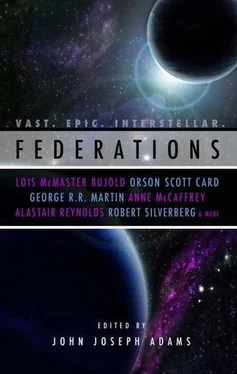“Speak of this to no one else, and you will be spared eternal winter,” she said, and bestowed a chilling kiss upon him—and the ice encased him with whiteness.
Ghenji blinked as the cocoon opened, and Rokujo smiled at him, bending down and brushing his lips with hers—warm and merely apple-red, rather than chill and cherry red.
“You gave even me quite a bit of trouble,” she murmured, “but you’ll be fine.”
“You’re not…” He remembered the words of the snow-woman in white—so like, if not identical to Rokujo—and he forced a smile.
“I am what I am, and you have a very good memory, for which I’m grateful.” She kissed him gently once more. “Besides, you really don’t believe in those ancient legends, do you?” Her white eyebrows arched, just slightly, but sinuously.
This time, after her kiss, his body and blood did not turn to ice.
TERRA-EXULTA
by S. L. Gilbow
S. L. Gilbow is a relatively new writer, with three stories published to date, all in The Magazine of Fantasy & Science Fiction . He debuted in the February 2007 issue with “Red Card,” a dystopian SF story in the vein of Shirley Jackson’s “The Lottery.”
Gilbow taught college English for a few years in the early nineties, but claims that he hasn’t had much training in writing fiction. He says he’s currently writing the great American novel. He’s only got one line so far, but says to trust him, it’s definitely going to be great, and it’s definitely going to be American.
This story is about language and how words can be created and used. It was inspired by the word “grimpting,” which was made up in junior high by Gilbow’s wife, her sister, and a childhood friend. Gilbow says he and his wife use it to describe those things that are so bad you can’t think of another word for them.
So add that one to your vocabulary, just don’t use it in reference to any of these stories.
I submit the following translation to the Galactic Society of Ancient Languages in response to the absurd assertion made at our last conference. Although we all agree that Archaic Planetary English can be translated into our Galactic Standard, some still hold that the process cannot be effectively reversed. Therefore, I submit the following sample of my work as evidence that such a translation is indeed possible.
I have selected a transmission at random from my files so that none can accuse me of selecting text based solely on its simplicity. I have chosen to retain some words in Galactic Standard, but only those few which cannot be logically translated. However, rest assured, the text below, and even this introduction written in that ancient language, could have been understood on Earth so very long ago. I hope, once and for all, this puts this issue to rest.
Doctor Galwot Kradame
Linguist
• • •
My Good Doctor Kradame,
May this transmission find you safe, warm, and well. It is difficult to believe seventeen years have passed since last we met. Where does time flow? I plan to return to the old system within the half-year and hope to see you once again. I will soon complete my latest project and begin the long journey home, to Earth—that place I left so very long ago. I have been gone far too long. It is now time to return.
I read your recent article in Interstellar Linguistics with great enthusiasm. Your proposal to translate our language into Archaic Planetary English fascinates me. If you want for material, I welcome you to use one of my works to complete your exercise. I recommend two of my articles for your consideration: “Terrology Made Simple” and “My Vision, My Worlds.” I await with great curiosity to see if such a translation—as academic as it may be—can actually be accomplished.
I also enjoyed your superb study of languages in this part—let us call it “my part”—of the Galaxy. Your analysis was brilliant, as always, and I delighted in seeing the information I provided you regarding dead languages proved helpful. I appreciate the eloquent way you put it: “Experience is surpassed only by more experience.”
In your previous transmission you asked me to identify all the words I have coined that are now a permanent—if anything is permanent—part of our wonderful language. As you know well, my career has been long and my writings voluminous, so attempting to track down every word I have created—intentionally or unintentionally—would prove futile. Nevertheless, as a lover of language, like you, I treasure the opportunity to highlight a few words which come to mind.
Certainly the word I must first mention is “grimpting.” To define “grimpting” would, of course, be ludicrous. It is so common now, I might as well define “planet,” “terraship,” or “lubradroid.” Nevertheless, it is the word for which I am best known, so, with your kind indulgence, I will tell you how this word first came to be. It is a story I seldom relate.
Truth is truth, so I must admit that I was not the first to use the word; although, to the best of my knowledge, I was the first to form it into writing. I initially heard the word “grimpting” from a young worker of mine while I headed the Kolome Project. Although you are, by decades, younger than I, I am sure you have heard stories of what a difficult project that turned out to be. I can assure you there is much truth in those stories—and many lies. What a troubling project. What a troubling time.
Kolome provided some unique challenges we had not previously encountered. This was long ago, back when we were still working out many of the protocols for terraforming planets and our Federation was still young—when the various species scattered across the galaxy were just learning to work with one another.
In my defense, I arrived on the project quite late, well after things had grown complicated. But I can assure you we began making steady progress soon after my arrival.
One day—with day being relative of course—I was leading a meeting on a capital-class terrology station orbiting Kolome. This was no ordinary gathering of petty busicrats. No faclicants or holo-reps were allowed. Only those who had proven themselves worthy were invited, and all the representatives, each carefully selected, had traveled very far. Some came from our most newly developed planets. The rest came all the way from Earth, such was their profound commitment to this project.
I held the meeting in the station’s main conference room where a long table stood before an enormous window looking out over Kolome, a beautiful red drop in the distance. Outside the window six Klarmond ships, even now considered the finest terraships ever built, were lined abreast in construction formation. Have you ever seen a Klarmond ship, Doctor Kradame? Nothing else made by man possesses such power. Two Klarmond ships can transform a small planet in a half-year. They can level mountains or empty seas, move continents or cleanse a chlorine atmosphere. Initially I ordered the Klarmond ships to Kolome merely to illustrate my resolution. Initially, I had no intention of actually using them.
The meeting turned out to be quite a challenge. Five senior leaders, seven adjuncts, a full team of my engineers and I were struggling with some delicate issues, but things were going very well and some wonderful ideas were being tossed about. Just as I made an excellent point, a point—you must understand—with which almost everyone agreed, one of the engineers sitting next to me slammed her hand down on the conference table making a sound as deafening as a continental Klarmond shot. I assure you, I have been in many meetings in my life, and that is the only time I have ever witnessed such uncivilized behavior. But she did. She hammered the table with the blunt of her hand and shouted, much to my embarrassment, “This is the most grimpting thing I have ever heard in my life.”
Читать дальше












